For many people, a garden is associated with happy family memories, but gardening also provides health benefits for people living with Parkinson’s. When you plant a garden, pull weeds or water your flowers, you’re not just getting chores out of the way – you’re improving your mental and physical health.
Whether you have a green thumb or are just getting started, gardening can help you live well with Parkinson’s. In this article, we’ll take a look at how.
PHYSICAL EXERCISE
According to the Centers for Disease Control and Prevention, you can burn about 330 calories doing one hour of light gardening and yard work. In fact, you can burn more calories gardening than you can walking at a moderate pace for the same amount of time.
Gardening requires the use of your hands and fingers to perform many different tasks, therefore you are strengthening your fine motor skills, building strength, and flexibility. This type of exercise—moving your hands and fingers to grab, lift, pull, push, and press—can help minimize muscle cramping.
Tending your garden also requires you to stand, reach, sit, squat, bend, and twist. These types of movement are fantastic opportunities to stretch and strengthen all the muscle groups in your upper body, neck, arms, shoulders, and hips.
TIP: Stretch before and after gardening. Yard work can make anyone stiff and sore, especially hunching over a garden, and this is especially true for people with PD.
Like any other moderate to intense physical activity, you’ll want to pace yourself, listen to your body if it wants to rest, and always have plenty of water on hand.
HEATHY EATING HABITS
Keep in mind that the fresher the produce, the better it tastes. You know how buying fruits and veggies at your local farmer’s market leads to higher-quality meals with fresher ingredients compared to buying frozen or canned produce?
Well, nothing’s fresher than eating something straight from your home garden. Not only is it jam-packed with vital nutrients, but food also just tastes better when you grow it yourself.
TIP: Planting vegetables and herbs in raised beds can help relieve pressure on the joints. It also helps to place a cushion under your knees if you plan on being low to the ground for extended lengths of time.
STRESS REDUCER
Pulling weeds, planting seeds or watering flowers may seem like strenuous work, but once you get into the zone so to speak, it can be extraordinarily relaxing.
If you’re gardening outdoors, you’ll receive the calming influence of time in the sun and in natural green spaces. Take the time to enjoy the process of tending your garden, as this is a perfect way for you to be present and mindful and to practice these important skills. Allow your garden to become a peaceful refuge that assists you in managing your journey with Parkinson’s.
TIP: Working in a garden can help you recuperate if you’ve experienced something stressful.
BUILDS COMMUNITY
To live well with Parkinson’s, it’s essential to stay engaged with others and to socialize frequently. Working in a garden with people of different ages, abilities, and backgrounds is a way to expand both what you know and who you know. Many gardeners enjoy sharing ideas about their favorite roses or a new type of organic compost with other gardeners and find friendship in garden clubs and similar groups. Gardening is also a rewarding activity to do with friends, kids, and grandchildren, not only helping you feel better physically and mentally but also giving you special memories with your loved ones.
Tip: Community colleges often offer classes on various aspects of gardening, from composting and seasonal planting to design and fostering beneficial insects to help your garden thrive organically.
IMPROVES MENTAL HEALTH
Being out in the garden even under minimal sun exposure can increase Vitamin D absorption and, in turn, increase levels of serotonin, a chemical in our brain responsible for balancing moods. Engaging in gardening activities can provide ample doses of vitamin D for a healthy mentality.
Research shows that daily gardening may lower the risk of dementia by 36%. There’s some debate about whether gardening on its own is enough to affect cognitive skills like memory and new evidence shows that gardening activities may spur growth in your brain’s memory-related nerves.
TIP: Begin a garden journal. Gardening requires planning, problem solving, and the ability to learn new skills and information, which keeps the brain active and creates new neural pathways.
As is true of almost any activity, gardening poses certain risks to your health and safety. The CDC recommends that you take these precautions while you’re in the garden:
- Pay attention to product directions any time you’re using chemicals in the garden. Some pesticides, weed killers, and fertilizers can be dangerous if used incorrectly.
- Wear gloves, goggles, long pants, closed-toe shoes, and other safety gear, especially if you’re using sharp tools.
- Use bug spray and sunscreen.
- Drink lots of water and take frequent shade breaks to prevent overheating.
- Listen to your body. It’s easy to injure yourself when bending over and spending time outside in the sun.
Key takeaways
Gardening invites you to get outside, interact with other gardeners, and take charge of your own need for exercise, healthy food, and beautiful surroundings.
Whether your patch is large or small, a raised bed, community garden, or window box, getting dirty and eating clean are good for you.
As you can see, gardening provides numerous benefits for people with Parkinson’s. As the weather turns warmer and the days grow longer, try your hand (with or without a green thumb) at the activity, and notice the many ways it can help you live well.
{"slide_show":3,"slide_scroll":1,"dots":"true","arrows":"true","autoplay":"true","autoplay_interval":3000,"speed":600,"loop":"true","design":"design-1"}
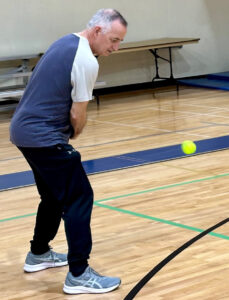 Pickleball, a sport that combines elements of tennis, badminton, and ping-pong, has gained recognition for its numerous benefits, particularly for individuals dealing with Parkinson’s disease. Several advantages of the sport include:
Pickleball, a sport that combines elements of tennis, badminton, and ping-pong, has gained recognition for its numerous benefits, particularly for individuals dealing with Parkinson’s disease. Several advantages of the sport include: The Pickleball group now thrives every Friday from 2:00 to 4:00 at the JCC, with the invaluable presence of Bo Sacks, a Senior Olympic winner and a top-ranked player in Tennessee. Bo brings not just expertise, but a patient and compassionate coaching approach tailored to individual skill levels.
The Pickleball group now thrives every Friday from 2:00 to 4:00 at the JCC, with the invaluable presence of Bo Sacks, a Senior Olympic winner and a top-ranked player in Tennessee. Bo brings not just expertise, but a patient and compassionate coaching approach tailored to individual skill levels.
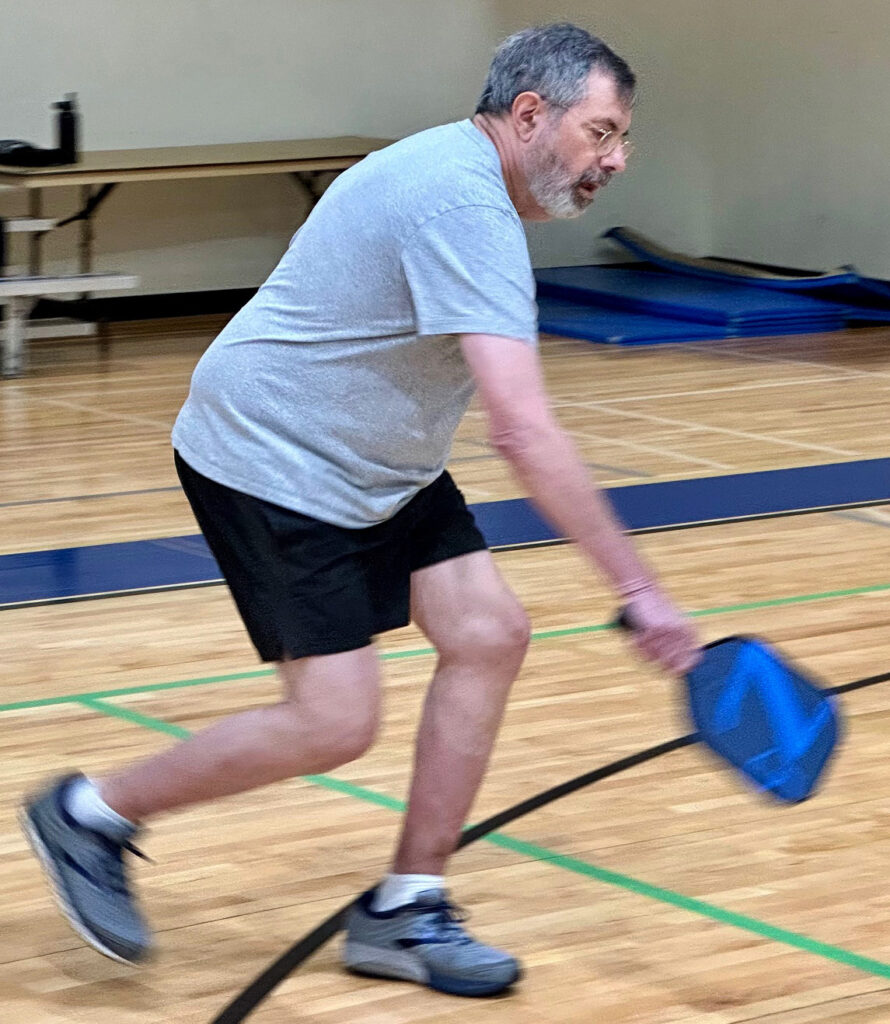
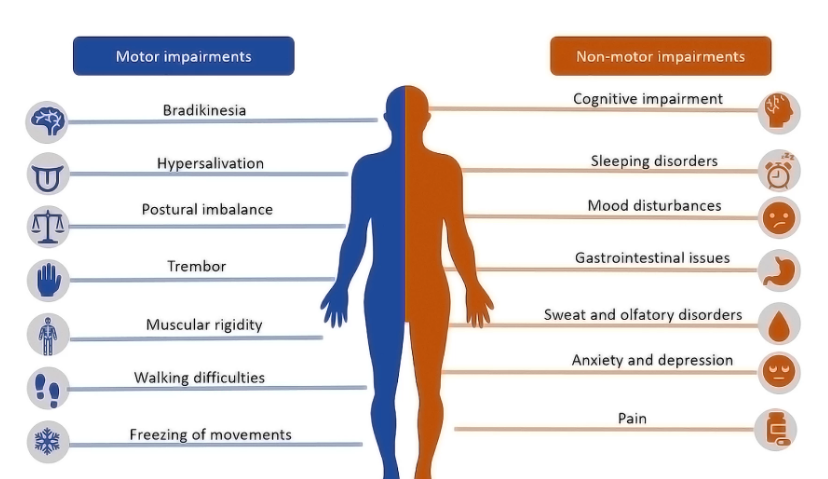
















 When it comes to fruits, blueberries are particularly beneficial for individuals with Parkinson’s. These small, antioxidant-rich berries offer a host of advantages.
When it comes to fruits, blueberries are particularly beneficial for individuals with Parkinson’s. These small, antioxidant-rich berries offer a host of advantages.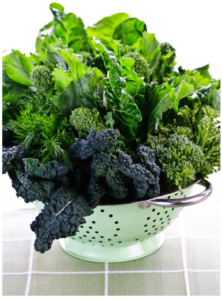 individuals living with Parkinson’s disease. These vibrant greens are loaded with essential vitamins, minerals, and antioxidants that support brain health and overall well-being.
individuals living with Parkinson’s disease. These vibrant greens are loaded with essential vitamins, minerals, and antioxidants that support brain health and overall well-being.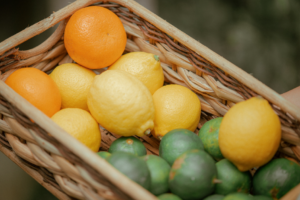 Citrus fruits like oranges, grapefruits, and lemons not only add a burst of flavor to your meals but also provide valuable benefits for individuals living with Parkinson’s disease. These brightly colored fruits are renowned for their high vitamin C content and other beneficial compounds.
Citrus fruits like oranges, grapefruits, and lemons not only add a burst of flavor to your meals but also provide valuable benefits for individuals living with Parkinson’s disease. These brightly colored fruits are renowned for their high vitamin C content and other beneficial compounds.

 For many, the holidays are a joyful time to gather with loved ones and friends, reflect on the past year and think about what’s to come. But for some with recently diagnosed or progressing Parkinson’s or with depression or anxiety, it can be a stressful or lonely time. Visiting with others can bring worry or increased symptoms, and not attending social events can bring feelings of isolation. These are natural and common reactions.
For many, the holidays are a joyful time to gather with loved ones and friends, reflect on the past year and think about what’s to come. But for some with recently diagnosed or progressing Parkinson’s or with depression or anxiety, it can be a stressful or lonely time. Visiting with others can bring worry or increased symptoms, and not attending social events can bring feelings of isolation. These are natural and common reactions. “PFP has been the most important resource I have,” said Dan Bell when discussing his Parkinson’s Journey. His wife, Gwen (an employee at Vanderbilt) heard about the Peterson Foundation for Parkinson’s Active with Parkinson’s support group one day at work shortly after Dan was diagnosed. After a decade of experiencing executive skills and memory issues, Dan was officially diagnosed in 2018 with Parkinson’s. Dan does not experience rest tremors, instead he says his greatest issues include weakness and pain in his feet, and many of the typical non-motor symptoms such as acting out dreams in his sleep or having overall stiffness throughout his body during dopamine medicine off times.
“PFP has been the most important resource I have,” said Dan Bell when discussing his Parkinson’s Journey. His wife, Gwen (an employee at Vanderbilt) heard about the Peterson Foundation for Parkinson’s Active with Parkinson’s support group one day at work shortly after Dan was diagnosed. After a decade of experiencing executive skills and memory issues, Dan was officially diagnosed in 2018 with Parkinson’s. Dan does not experience rest tremors, instead he says his greatest issues include weakness and pain in his feet, and many of the typical non-motor symptoms such as acting out dreams in his sleep or having overall stiffness throughout his body during dopamine medicine off times.